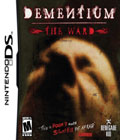Genre: Survival Horror
Publisher: Gamecock
Developer: Renegade Kid
Release Date: Q4 2007
Back when the Nintendo DS first came out, one of the most frequently heard comments was that it was a surprisingly good system for first-person shooters. Between then and now, every developer on the face of the planet has seemingly forgotten that in favor of publishing a variety of touch-screen-dependent 2D games.
Dementium is a break in that routine. The development studio, Renegade Kid, is a new house made of veterans of the Turok series on the Nintendo 64, and they've sat down to provide the DS with one of its first first-person shooters, as well as what may be its first real survival-horror title.
The game's plot isn't precisely innovative, admittedly. You wake up in a squalid room in what appears to be an abandoned sanitarium. You have no memory, and your only clue in that direction is a note written in blood on the floor. It reads, "WHY DID YOU DO IT?" and is wrapped around the key that'll let you out of the room.
The halls of the sanitarium look ancient, like it's been abandoned for a very long time, and like it may have been abandoned in the middle of an apocalypse. The only things left in the building are, naturally, monsters, and you must defend yourself if you want to live.
Renegade Kid has been playing a lot of survival-horror games, and it shows from the moment you pick up Dementium. The sanitarium is dark, lit only by the flickering beam of your flashlight, and monsters have a habit of appearing out of nowhere. When they're killed, they disappear into nothing, leaving the disturbing impression that they may have been nothing in the first place. Maybe you're just crazy.
At the same time, Dementium uses the same trick Silent Hill does of providing bizarre puzzles completely out of context, lending the game an odd sense of dream logic. Some of them are fairly natural, like finding keycards or looking for passwords. Others, such as using a child's piano to unlock a door, aren't. The overall effect is genuinely creepy, and practically made for playing in dark rooms at night.
You navigate through the halls using the d-pad, with context-sensitive controls for picking up things. To aim, you trace on the touch-screen with the stylus, firing or swinging with the L button whenever your crosshair passes over a target.
One interesting addition that Dementium brings to the table, both for a survival horror game and a DS game, is the character's notepad. By touching a button on the screen, you can open the notepad and write on it with the stylus. The interface is a lot cleaner and more sensitive than Pictochat, allowing you to keep notes without having to scramble for pen and paper. This, in turn, is a big part of solving many of the game's puzzles, as you can keep hints and puzzles handy as you move from room to room. What you've scrawled on the notepad will remain there even when you shut off the DS.
Dementium admittedly isn't perfect. The character cannot sprint, which makes dodging to the side difficult. You can't carry medical supplies, either, and you can't carry a weapon and the flashlight at the same time, forcing you to choose between self-defense and being able to see. Several of these problems will hopefully be fixed by the time the game sees release later this year, which would be good. Whether it succeeds or fails, Dementium is at least something new for the DS, and deserves to be followed by a host of imitators.
Preview by: Thomas Wilde
More articles about Dementium: The Ward













 Dementium: The Ward, previously known as The Ward, tells a twisted story with gruesome 3D visuals and FPS gameplay. The game's interactive narrative reveals the puzzling nature of a strange hospital frozen-in-time, and introduces a cast of peculiar characters.
Dementium: The Ward, previously known as The Ward, tells a twisted story with gruesome 3D visuals and FPS gameplay. The game's interactive narrative reveals the puzzling nature of a strange hospital frozen-in-time, and introduces a cast of peculiar characters.












